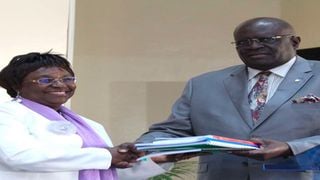
Professor Fatuma Chege and Education Cabinet Secretary, George Magoha, at Kenya Institute of Curriculum Development, Nairobi on July 4, 2019. According to a team chaired by Prof Chege, universities should invest in science, technology, engineering and mathematics courses.
| File | Nation Media GroupEducation
Premium
Varsities to review courses as CBC roll-out approaches
University education is set to undergo tremendous changes when it rolls out the competency-based curriculum (CBC) amid concerns over preparations for the transition and the financial crisis many public universities are in.
The transition from senior secondary school is expected to happen in 2029, when the more than 1.2 million learners who are in Grade 5 will join university. The learners will join junior secondary school in January 2023 and senior secondary in 2026.
According to projections by the Task force on Enhancing Access, Relevance, Transition, Equity and Quality for Effective Curriculum Reforms Implementation, enrolment in universities will increase threefold, calling for heavy investment in infrastructure and human resources. The task force was chaired by Prof Fatuma Chege who was later appointed the principal secretary for Implementation of Curriculum Reforms.
“About 420,000 students will be expected to join university, with the assumption that 33 per cent will transit to university then as the remaining 67 per cent join various tertiary institutions. Infrastructure at the universities must be seriously addressed,” the task force report reads.
This is a huge figure to enrol in one year considering that currently, all universities have a total enrolment of 510,000. In the next eight years, the number is expected to rise to about 1.2 million students undertaking university education.
By last year, when the data was collected, the University of Nairobi had the highest enrolment at 80,056 followed by Kenyatta University (48,833), Moi University (32,640), Kisii University (23,134) and Masinde Muliro University of Science and Technology (19,875).
Curiously, these universities have in the recent past been embroiled in either administrative crises or are steeped in huge debts and face serious financial challenges.
The public universities with the lowest enrolment were Bomet University College (473), Alupe University College (631), Tharaka University College (1,007), Garissa University (1,407) and Kaimosi Friends University College (1,892).
The increased numbers will also necessitate increased funding for the Higher Education Loans Board (Helb) whose funding many students rely on to finance their university education. Some students have been missing out on loans due to low funding of the board by the Exchequer, with the average allocation being Sh37,000 per student annually.
In the current financial year, university education was allocated Sh76.3 billion, with Helb receiving Sh15.8 billion.
Another concern is lack of adequate academic staff in universities. This will be compounded by the sharp rise in student enrolment. The task force pointed out that Kenyan universities rely considerably on part-time services.
“Further, it was noted that some of the staff are not qualified to teach academic programmes as per the guidelines provided by the Commission for University Education (CUE). Only about 30 per cent of the university academic staff have PhD qualifications, which is the requisite to teach at university level,” the report reads.
According to CUE, as at 2019, only 5,604 lecturers had PhDs while 8,693 others had Master’s qualifications and 1,365 held Bachelor’s degrees. Those with diploma qualifications were 656.
“One of the proxies of quality of education offered at universities is the staff-student ration (SSR). Overall, the SSR in Kenyan universities is above the recommended levels,” reads the report.
For example, the recommended SSR for social sciences is 1:18, the current ratio for bachelor of education (science) in public universities is 1:186. Veterinary medicine has the best ratio at 1:6 with 193 lecturers handling 1,122 students.
“The situation is below the set standards by CUE. Therefore, this needs to be addressed in view of the expected roll-out of CBC by 2029 and the increased number of students who will be joining universities,” the task force recommended.
CUE had set a December 2019 deadline for all lecturers at universities to obtain PhDs but this was blocked after lecturers from the Machakos University and the Universities Academic Staff Union went to court and had the recommendation nullified. The court imposed a permanent injunction against CUE from implementing the policy.
Prof Chege’s task force recommended that universities retool lecturers by providing pedagogical training responsive to the CBC approach. Lower primary school teachers have been trained while those for upper primary are being trained. The Teachers Service Commission has announced that it will next year train secondary school teachers on the curriculum.
Under the CBC, university education will take three years in a departure from the current four. The learners will, however, take longer in secondary school (six years). It is expected that they will be exposed to deeper content while in senior school, therefore spend a shorter period in university.
The task force recommended that “universities review existing curricula and align them with the Basic Education Curriculum Framework and the national agenda”.





